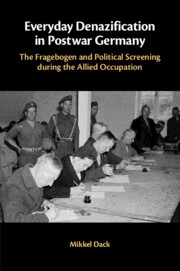
- Cited by 2
-
Cited byCrossref Citations
This Book has been cited by the following publications. This list is generated based on data provided by Crossref.
Costalli, Stefano Guariso, Daniele Justino, Patricia and Ruggeri, Andrea 2024. The Violent Legacy of Fascism: Evidence From Italy. Comparative Political Studies,
Gusejnova, Dina and Wünschmann, Kim 2025. A paralegal institution: tribunals and the place of law in the framework of internment during the Second World War. Immigrants & Minorities, p. 1.
- Publisher:
- Cambridge University Press
- Online publication date:
- March 2023
- Print publication year:
- 2023
- Online ISBN:
- 9781009216326


